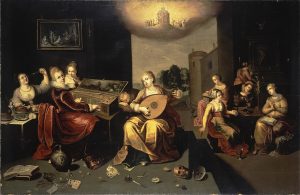Illuminations on the Lectionary readings for Aug. 7, 2022 (Pentecost 9C)
First Reading (Track One): Isaiah 1:1, 10-20
In recent weeks we have heard from the Prophets Amos and Hosea, who prophesied to the Northern Kingdom of Israel as it fell to the Assyrians.

Parable of the Wise Virgins who had their lamps ready and the Foolish Virgins Who Did Not (c.1616), oil painting on canvas by Hieronymous Francken II (1578-1623). Hermitage Museum , St. Petersburg, Russia. (Click image to enlarge.)
Now our Track One first readings come to perhaps the greatest of all the prophets – Isaiah – who prophesied to the Southern Kingdom, Judah, a generation later as it fell under threat from the Babylonians. Isaiah’s message is consistent with the earlier prophets in its anger – for example, it likens the people to the residents of Sodom and Gomorrah – and in its lament: The chosen people are going to lose the promised land and the temple. They will be forced into exile because they have failed to keep the covenant that Moses made with God: to “do good; seek justice, rescue the oppressed, defend the orphan, and plead for the widow.”
First Reading (Track Two): Genesis 15:1-6
In recent weeks in our Track Two first readings we’ve heard about Abraham, the patriarch of the chosen people: God promised that Abraham and Sarah would have a son. Abraham bargained with God to spare Sodom and Gomorrah if only he could find a few honest people there. Now we turn back to an earlier time. We pick up Abram’s story at an earlier point, when God has not yet named Abraham. Abram makes no secret of his frustration that he and his wife, Sarai, are still waiting for the heir that God has repeatedly promised them. Abram asks God for reassurance, and God responds, repeating the promise that their descendants will be as numerous as the stars.
Psalm (Track One): Psalm 50:1-8, 22-23
In a way, this Psalm expands on the prophecy that we heard in the Isaiah reading. God is not tired and angry about the people’s offerings of thanksgiving and sacrifice, but God expects us to keep our covenant of faith. God calls us to be thankful, to practice righteousness and justice in our lives. God’s expectations of the people are clear and firm: Those who forget God literally risk being torn apart, but those who keep God’s way and remember Israel’s covenant will know salvation.
Psalm (Track Two): Psalm 33:12-22
Think of how grateful Abram must have been after he heard God’s reassurance that his descendants would be more numerous than the stars. In similar feelings of gratitude the Psalmist sings of relief, joy and thankfulness for God’s love and care. As the prophets consistently shout, the nations and people whom God chooses will be happy; God’s eye remains on those who wait for the Lord. Those who trust in the Lord’s name will know God’s loving-kindness.
Second Reading: Hebrews 11:1-3, 8-16
The Letter to the Hebrews holds an unusual place in the New Testament: Probably written late in the first century, perhaps around the same time as Matthew’s Gospel, its intended audience is thought to have been Jewish Christians who were considering a return to Judaism to escape vicious anti-Christian persecution by the Roman authorities. Throughout its text, sometimes using terms that can sound anti-Jewish to modern ears, the author of Hebrews argues that Christianity is the better way. In these verses, though, the author takes care to speak well of the Abrahamic tradition expressed by the prophets, declaring that Jews and Christians will inherit the city of God through faith, beautifully described as “the assurance of things hoped for, the conviction of things not seen.”
Gospel: Luke 12:32-40
Do not be afraid, Jesus assures his little flock of followers. God’s kingdom is coming. Still, those who heard Jesus speak the next few lines could be excused for being more than a little fearful: Sell your possessions, Jesus tells them. Make durable purses, and be ready to go when Jesus calls. We don’t know when a thief might come into our house at night, Jesus warns; and who wouldn’t be afraid about that? This is Jesus’s way of telling the apostles to remain ready. The Kingdom may come when we least expect it, bringing us “unfailing treasure in heaven, where no thief comes near and no moth destroys.”
